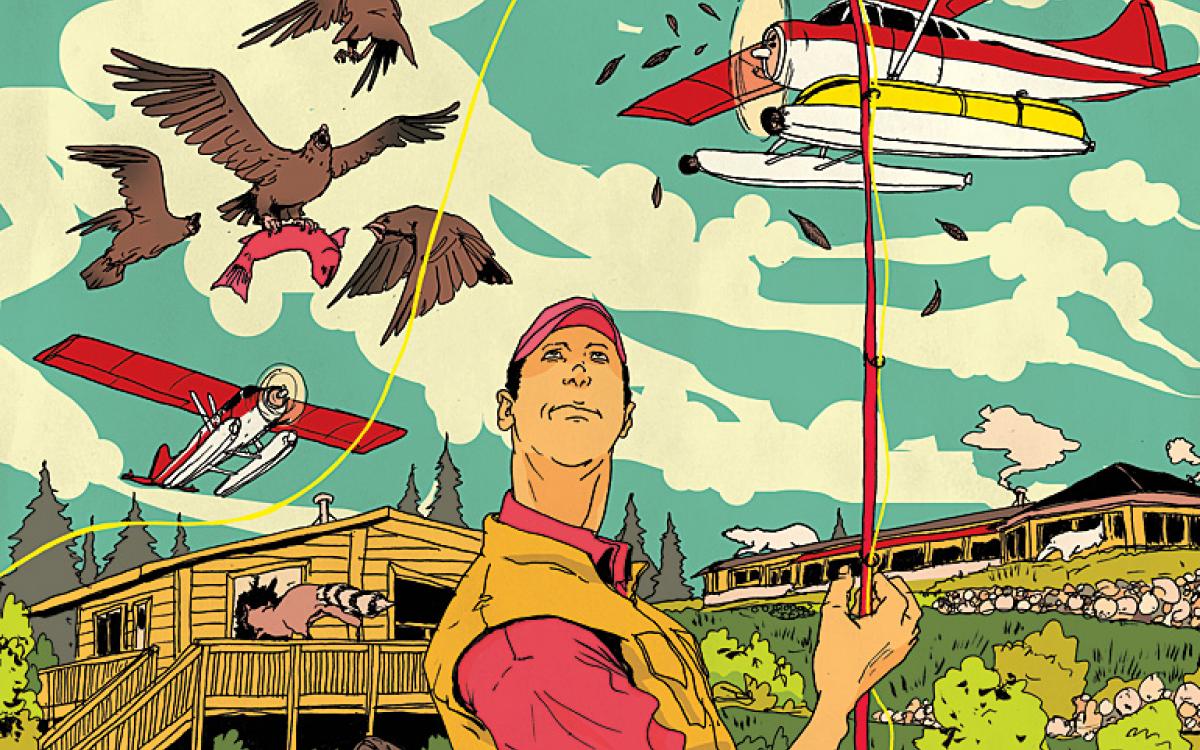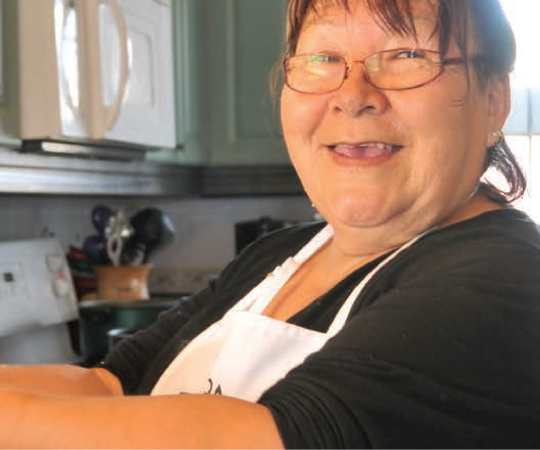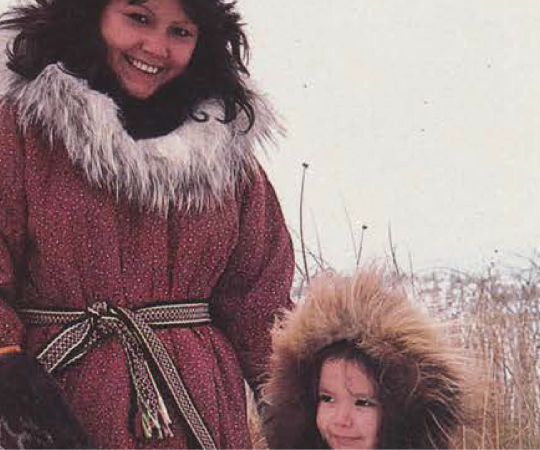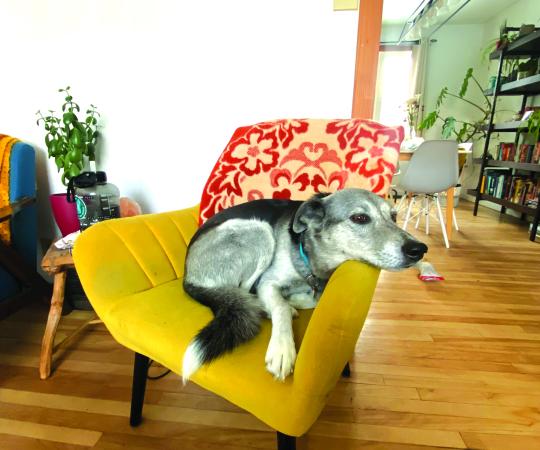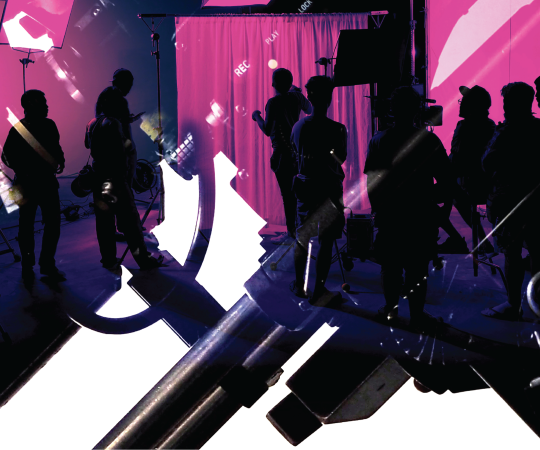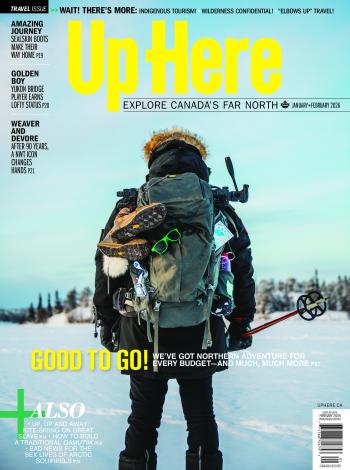As he does every March, Mike Reimer hops onto his vintage 1964 Caterpillar D6B ’dozer and sets off north from Churchill, travelling along Hudson Bay’s frozen coast at a blistering four kilometres an hour. He’s towing a sled loaded with more than 36,000 kilograms of supplies—everything from diesel, propane and batteries for a new solar energy system to furniture, lumber and food—bound for his family’s four fly-in lodges, as far as 300 km away.
Meanwhile, buzzing around the ponderous Cat like worker bees, snowmobiles check ice conditions ahead, venture inland in search of logs that will be jammed into the slush holes the Cat will inevitably slip into, and harvest the lodges’ seasonal stash of firewood. Then they hook back onto their qamutiqs, each piled with 907 kg of freight, and re-join this slow-moving springtime convoy.
A 1,000 Pound Squirrel
In 2004, the procession arrived at their Seal River Lodge to find that a local bear had smashed through wooden shutters bristling with six inch nails. Every window was punched out, cupboards torn off walls, a fridge flattened, plastic liners peeled out of showers. “They love plastic,” says Reimer. “It was like having a 1,000-pound squirrel in your kitchen.” Foxes, wolves and Arctic hares had also taken up residence throughout the winter, nestling amid a snow drift that reached the ceiling. It took four men three days to shovel out the snow and debris. The only thing untrashed: a single jar of honey, sitting untouched atop a half-metre high carpet of rubble.
Though rare these days, “Cat Trains” were once a common way of transporting gear to remote Northern outposts. This year’s trip took 10 days of travelling nearly 16 hours a day. “It’s the highlight of our spring,” says Reimer. “Sure there are breakdowns—cables snap and engines catch fire—but it’s good fun and a great adventure.”
How steep was the learning curve? “Vertical,” says the private pilot, who has previously managed boutique hotels in Korea and Cambodia. What was the toughest part? “Everything.”
As any of the lodge operators across the North—running everything from basic fishing camps to deluxe eco-destinations—will tell you, there’s no shortage of adventure when managing a wilderness outpost. It doesn’t even have to involve polar bears. It can be hairy just getting to the office. Gebhard Zuern was en route to his remote Yukon Tagish Wilderness Lodge when his GPS failed and he spent a night outside during a raging snowstorm. And back in 1969, flying from Hay River with supplies to help open Nunavut’s Bathurst Inlet Lodge for its first guests, Trish Warner’s Cessna hit bad weather and she was forced to land on a lake. Her anxious husband Glenn waited for news for two weeks before his wife was spotted and rescued—after she’d flashed a mirror at a passing DC3. The lodge opened on time four days later.
Generators fail. Things freeze, thaw, flood, or simply stop working in extreme cold. Orchestrating convoluted logistics is part of everyday life when you’re moving people or cargo via planes, snowmobiles, boats and dogsled teams, especially when many lodges are cut off from the outside world for months during spring break-up and fall freeze-up. Blizzards can ground planes any day of the year.
Needing something as simple as wrench or replacement part can be devastating when you’re 1,000 kilometres from the nearest store. “You quickly learn to have back-ups for back-ups for back-ups,” says Gebhard Zuern. He also learned to stop fighting nature. “Something that would take you three weeks to do in the south can take a year in the North.” And he realized that being a lodge owner meant taking on simultaneous careers—plumber, electrician, mechanic, chef, maid, psychiatrist. How steep was the learning curve? “Vertical,” says the private pilot, who has previously managed boutique hotels in Korea and Cambodia. What was the toughest part? “Everything.”
[[{"fid":"234","view_mode":"default","fields":{"format":"default","field_file_image_alt_text[und][0][value]":"","field_file_image_title_text[und][0][value]":""},"type":"media","attributes":{"alt":"One of Plummers Lodges outpost camps on the Tree River in Nunavut. Photo courtesy Plummers Arctic Lodges.","title":"One of Plummers Lodges outpost camps on the Tree River in Nunavut. Photo by Plummers Arctic Lodges.","height":"433","width":"770","style":"font-size: 13.0080003738403px; line-height: 1.538em; width: 770px; height: 433px;","class":"media-element file-default"}}]]
Institutions of the Wild
Since the first bush planes opened up our outback, remote fishing and hunting lodges have become Canadian icons, looming picturesquely on rivers and lakes from the Yukon to Labrador. For a certain class of Canadian, it became a rite of passage for fathers to take their sons to a Northern camp, while any boss worth his salt rewarded star employees with a team-building trophy trout retreat.
A venerable institution, and one of the oldest still operating, is Great Slave Lake’s Plummer’s Arctic Lodges. Back in 1938, a Tłı̨chǫ chief guided businessman C.C. “Chummy” Plummer 240 kilometres up the lake’s East Arm to Taltheilei Narrows, so he could see a legendary fishing spot. He built a basic camp—starting with a single cabin—and his bush pilot son, Warren, flew Ontario fishermen 2,000 kilometres up in his de Havilland Beaver. Plummer’s still holds world records for lake trout and Arctic char, though in recent years they’ve adopted a strict “hug-and-release” policy for trophy fish, which take decades to reach their full glory.
Over the past 20 years, successful Northern lodges have shifted away from old-school huntin’ and fishin’ experiences towards wildlife and Northern Lights viewing, aboriginal culture and soft adventure experiences.
In the golden era of lodges, business boomed. Plummer’s grew to two main lodges on Great Slave and Great Bear lakes, with several outpost camps.
But that was then. “Business has been terrible for almost a decade,” says Plummer’s general manager today, Chuk Coulter. After the cumulative effects of 9/11 in 2001 and the economic crash of 2008, many Northern lodge owners like C.C.’s grandson, 71-year-old Chummy Jr., now find themselves facing a new set of challenges. “The big money is gone, there are far fewer fishermen in this generation and the corporate business has all but vanished due to cutbacks.” Coulter compares a $5,000 week at Plummers with a $700 drive-in lodge north of Toronto. “Our floatplanes alone burn a $1,000 barrel of oil an hour. We can’t compete.”
It’s the same story at hunting lodges like Ungava Adventures, which Sammy Cantafio has been running with an Inuit partner, Maggie Sandy Annanack, in Nunavik for 34 years. Planes bound for Kuujjuak were once packed with camouflage-clad hunters bound for one of the outfitter’s 12 caribou hunting camps. “We would have 300, 400 a year and they pumped huge dollars into the region,” says Cantafio, “but since 2008, we’re lucky to get 75, and we’re down to two camps.” In the past 10 years, the number of hunting and fishing outfitters in Nunavik has plummeted from 35 to six, with client numbers dropping from 8,000 to about 500.
A New Niche
Cantafio is resigned. “It’s a new economy, a new generation.” Operating expenses in Nunavik means a $7,500 price tag on a week’s hunt. “I get it,” he says. “You’re staying in a basic plywood camp with mosquitoes and blackflies. We’re competing with Churchill’s polar bears and Asia, where the same money buys you a luxury resort, elephants to ride and spas.”
That said, some fishing lodges—especially five-star, environmentally sensitive fly-fishing resorts—are thriving, proving you can create enthusiasm among non-traditional lodge types, like youth and women, if you do it right. Gudie Hutchings of Rifflin’ Hitch Lodge in Labrador politely declined to discuss her fly-in operation. “Every time someone writes about us, I get phone calls from people who turn angry when they learn our waitlist for a booking is three to four years.”
Over the past 20 years, successful Northern lodges have shifted away from old-school huntin’ and fishin’ experiences towards wildlife and Northern Lights viewing, aboriginal culture and soft adventure experiences in environmentally responsible resorts—where food and wine are high-end.
Some outfitters, such as Churchill Wild, converted several of their string of former hunting and fishing lodges in the mid-’90s. They learned most successful operations these days offer as much culinary and chocolate-on-the-pillow pampering as possible—as well as innovative experiences for clients looking to check off a bucket list. Their latest project: upgrading a failed fly-in goose hunting lodge south of Churchill, within a polar bear denning area where visitors will have the chance to observe mothers and their cubs in the wild.
Bearspotting is a booming business, and no one knows that better than Frontiers North, the folks who dreamt up the now iconic big-wheeled Tundra Buggies, which drive visitors directly onto polar bear turf. They also have a multi-carriage lodge-on-wheels where 40 guests can overnight and then watch and photograph bears from sunrise through sunset.
[[{"fid":"235","view_mode":"default","fields":{"format":"default","field_file_image_alt_text[und][0][value]":"At Churchill Wild, the main attractions are furry, white and, given the chance, extraordinarily effective homewreckers. Photo by Dennis Fast","field_file_image_title_text[und][0][value]":"At Churchill Wild, the main attractions are furry, white and, given the chance, extraordinarily effective homewreckers. Photo by Dennis Fast"},"type":"media","attributes":{"alt":"At Churchill Wild, the main attractions are furry, white and, given the chance, extraordinarily effective homewreckers. Photo by Dennis Fast","title":"At Churchill Wild, the main attractions are furry, white and, given the chance, extraordinarily effective homewreckers. Photo by Dennis Fast","height":"949","width":"630","style":"width: 630px; height: 949px;","class":"media-element file-default"}}]]
The Right Kind of Crazy
During the day, when tourists are out bear-watching, a staff of three—including a chef—stays behind in the mobile lodge to prepare for their return or ready quarters for new guests. “It takes special people to work together all alone in cramped quarters for a non-stop eight-week stint during which they can’t set foot on the ground outside because of bears,” says Tricia Schers of Frontiers North. “It can be an incredible experience, but it’s also a high-tension, stressful job because they live in a bubble.” She has seen many people with plenty of Northern experience—including years in remote logging camps—bail on the job. “We’ve learned it’s all about selecting the right kind of person.”
“You need someone crazy enough to be resourceful all by themselves during a dark, windy -50C winter two hours by plane from the nearest civilization—but not too crazy.”
Tessum Weber agrees: “You need someone crazy enough to be resourceful all by themselves during a dark, windy -50C winter two hours by plane from the nearest civilization—but not too crazy.” The son of Arctic expedition leader Richard Weber, Tessum grew up in the family business of running Canada’s northernmost luxury lodge, Arctic Watch, a tented safari camp some 300 km north of the Arctic Circle on Somerset Island.
Not long ago, Weber began receiving frequent, increasingly strange satellite phone calls from the caretaker he’d hired to mind their second lodge, Arctic Haven, near the Barrenland caribou migrations at Ennadai Lake, Nunavut. The caretaker was supposed to stay there solo from September to April, maintaining lodge infrastructure against the relentless onslaught of the elements. “He couldn’t get the bulldozer going. Then he couldn’t clear the runway. Then he was freezing and had to turn the stove on to stay warm,” says Tessum, who repeatedly talked him through his crises. Finally it became clear that the caretaker was panicking, overwhelmed by his situation. “We pulled him out,” he says, “and fast.” These days they make sure to rotate two caretakers in and out through the winter.
[[{"fid":"237","view_mode":"default","fields":{"format":"default","field_file_image_alt_text[und][0][value]":"Luxury, Somerset Island-style. Some 300 km north of the Arctic Circle, Arctic Watch offers a top of the world safari. ","field_file_image_title_text[und][0][value]":"Luxury, Somerset Island-style. Some 300 km north of the Arctic Circle, Arctic Watch offers a top of the world safari. "},"type":"media","attributes":{"alt":"Luxury, Somerset Island-style. Some 300 km north of the Arctic Circle, Arctic Watch offers a top of the world safari. ","title":"Luxury, Somerset Island-style. Some 300 km north of the Arctic Circle, Arctic Watch offers a top of the world safari. ","height":"441","width":"770","style":"font-size: 13.0080003738403px; line-height: 1.538em; width: 770px; height: 441px;","class":"media-element file-default"}}]]
Cabin fever—claustrophobia, agoraphobia—is part of Northern lore, a cliché perhaps, but no joke. It doesn’t necessarily take weeks or months to kick in and it can be a scary, disturbing experience. One Yukon lodge operator remembers a client from Manhattan who came up to see Northern Lights. He was so alarmed by the acute silence outside on his first evening that he spent the rest of his visit indoors surrounded by others.
Local Heroes
A growing trend bringing visitors up North is aboriginal tourism—the chance to access the cultures of those who’ve been here since time immemorial. Many lodges prefer to hire aboriginal guides whenever possible. Knowledgeable locals who support their families traditionally with hunting, trapping and fishing can add depth to a lodge visitor’s experience, but it’s often difficult to find and retain them.
“The expectation of many people who come up here, especially Europeans, is to see Northern natives doing traditional things—like Amazonians pretending to be cannibals,” he says. “But Inuit have moved on into the modern world.”
Ungava Adventures’ Sammy Cantafio says it’s almost impossible for outfitters in Nunavik to find Inuit guides and cooks, because the hunting/fishing season is so short. “What are they supposed to do the other 46 weeks of the year?” This generation of Inuit wants full-time jobs, hesays, houses, iPhones. “The expectation of many people who come up here, especially Europeans, is to see Northern natives doing traditional things—like Amazonians pretending tobe cannibals,” he says. “But Inuit have moved on into the modern world.”
Still, in Arviat, one of Nunavut’s most traditional communities, the locals are saving a seat on the dogsled for visitors keen on a genuine cultural and wilderness experience run entirely by Inuit, including trained guides and chefs. The Arviat Community Ecotourism Initiative (ACE) is a three-year-old community-owned-and-operated experience unique in the Inuit world. And for decades, Frontiers North’s Elu Inlet Lodge near Cambridge Bay, Nunavut, has been successfully operated by an Inuit family living on site during the summer seasons, offering visitors interpretive hikes, immersive cultural programs and traditional country food.
Blachford Lake Lodge, 20 minutes by bush plane from Yellowknife, has long had a special relationship with the local aboriginal community. As well as regularly employing First Nations guides, they are the hosts of the twice-annual Dechinta Bush University, which offers six-week University of Alberta Native Studies accredited aboriginal courses taught by Northern leaders and elders.
Almost all early Northern lodges focused solely on fishing and hunting, so it was unusual when Glenn Warner, an RCMP Sergeant who used to patrol the Bathurst Inlet region by dogsled and boat, decided in 1969 to buy an old Nunavut mission house and Hudson Bay Company post and turn it a wildlife viewing outpost for folks who wanted to learn about Inuit culture. He partnered equally with the local Kapolak and Akoluk families—the only such 50-50 partnership in Nunavut—and started Bathurst Inlet Lodge, an operation that was decades before its time and became a Northern institution.
But in recent years, even this Arctic classic has fallen on hard times. “We can’t compete with the mass tourism of growing numbers of Arctic cruises who offer a longer, more comfortable and accessible experience for clients in the region,” says Glenn Warner’s son, Boyd, who is now in charge. “Business is so low that, for the first time ever, this summer we aren’t opening at all.” Warner is considering upping the Inuit families’ stake to 51 percent, so that the business would become eligible for Nunavut funding assistance.
It’s never been easy—for one reason or another—to work in the tourism industry in the stunning but untameable, far-flung landscapes of the North. The trials and tribulations for lodge operators will likely never cease, even as times change—the challenges are a part of the unique experiences they are selling. Yet, few of the lodge owners I talked to regret their decision to live out their Northern dream life, with its heady mix of freedom, solitude, and the special rewards of sharing the wilderness with others. Carson Schiffkorn, who runs the end Inn on the Lake outside Whitehorse, has a large Japanese clientele. He is especially moved when he finds young, single Japanese women from Osaka or Tokyo—who would never go out alone at night at home—standing outside at 3 a.m. by themselves in -40C darkness, staring up at the Aurora Borealis. “I never get tired of seeing people experience the North for the first time,” he says. “It changes them.”
[[{"fid":"236","view_mode":"default","fields":{"format":"default","field_file_image_alt_text[und][0][value]":"The Northern Lights illuminate the sky at Blachford. Photo courtesy of Blachford Lake Lodge","field_file_image_title_text[und][0][value]":"The Northern Lights illuminate the sky at Blachford. Photo courtesy of Blachford Lake Lodge"},"type":"media","attributes":{"alt":"The Northern Lights illuminate the sky at Blachford. Photo courtesy Blachford Lake Lodge","title":"The Northern Lights illuminate the sky at Blachford. Photo courtesy of Blachford Lake Lodge","height":"438","width":"770","style":"font-size: 13.0080003738403px; line-height: 20.0063037872314px; width: 770px; height: 438px;","class":"media-element file-default"}}]]

